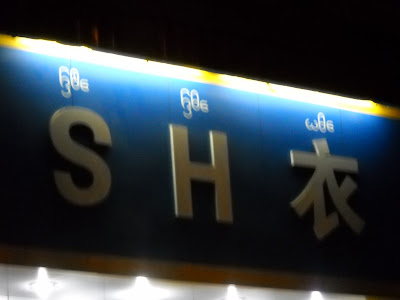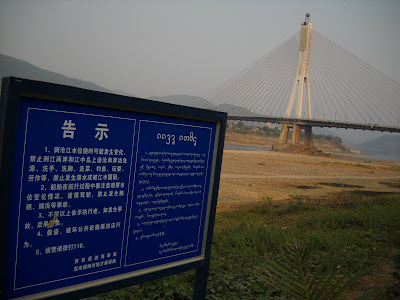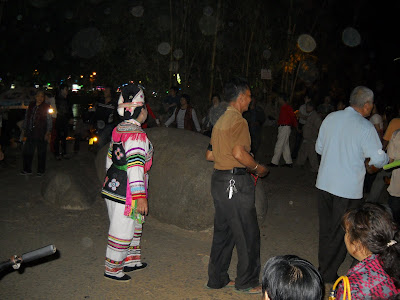
Jing Hong is the capital city of Xishuangbana, or the more official-sounding, Dai Autonoumous prefecture of YuanNan province. Although it is the Dai minority prefecture, there is no mistaking it as anything other than a Chinese city. But you would notice that most shops and building have signs in both Chinese and Dai scripts.
 The naga from Lao seems to have crossed the border and slither into the city here.
The naga from Lao seems to have crossed the border and slither into the city here. Many modern buildings here are topped with roof styled after the pagoda. Even the bus stop here gets the pagoda treatment.
Many modern buildings here are topped with roof styled after the pagoda. Even the bus stop here gets the pagoda treatment. At latitude of 21~22N, this is as far north as you get to find a tropical rainforest. And Jing Hong isn't lacking in greenary. Coconut and palm trees line the sidewalk. You may run into signs that warn about falling leaves and branches.
At latitude of 21~22N, this is as far north as you get to find a tropical rainforest. And Jing Hong isn't lacking in greenary. Coconut and palm trees line the sidewalk. You may run into signs that warn about falling leaves and branches. The geography and climate of Xishuangbana means it have many plants that you wouldn't find anywhere else in China. The city itself boast of two batonic gardens as tourist attraction.
The geography and climate of Xishuangbana means it have many plants that you wouldn't find anywhere else in China. The city itself boast of two batonic gardens as tourist attraction. Within the prefecture, you will find rubber plantations, and many plants used in Chinese medicine.
Within the prefecture, you will find rubber plantations, and many plants used in Chinese medicine.
 Once it crosses the border, the Mekong river changes it name to LanChang river. Usually, the water level should be high enough to support river traffic up and down the Mekong. In Jing Hong itself, there is a port of the same name, but while I was there, there was no ships docking at the harbour.
Once it crosses the border, the Mekong river changes it name to LanChang river. Usually, the water level should be high enough to support river traffic up and down the Mekong. In Jing Hong itself, there is a port of the same name, but while I was there, there was no ships docking at the harbour. While the water level isn't very high this year, you are still not allow to wash your feet or vegetables in the river.
While the water level isn't very high this year, you are still not allow to wash your feet or vegetables in the river. There is no rule stopping you from washing your motor bike though.
There is no rule stopping you from washing your motor bike though. I have actually arrived in Jing Hong while the Southwest provinces (Yunnan included) of China experiencing the worst drought in a century. The irony is that one of the greatest tourist attraction in Xishuangbana is the Water-splashing festival (mid April, known as the Songkha festival in Lao and Thailand.) To attract Chinese from other parts of the country to the prefecture, there is actually a theme park where it is Water-splashing festival every day.
I have actually arrived in Jing Hong while the Southwest provinces (Yunnan included) of China experiencing the worst drought in a century. The irony is that one of the greatest tourist attraction in Xishuangbana is the Water-splashing festival (mid April, known as the Songkha festival in Lao and Thailand.) To attract Chinese from other parts of the country to the prefecture, there is actually a theme park where it is Water-splashing festival every day. Once the hot tropical sun sets on the city, the folks gather to do a bit of singing and dancing.
Once the hot tropical sun sets on the city, the folks gather to do a bit of singing and dancing.




No comments:
Post a Comment